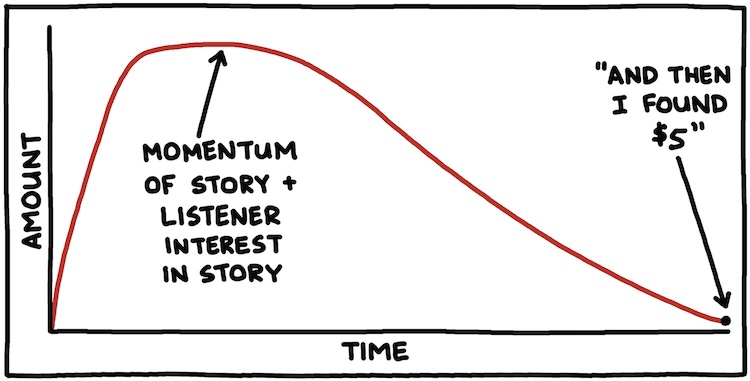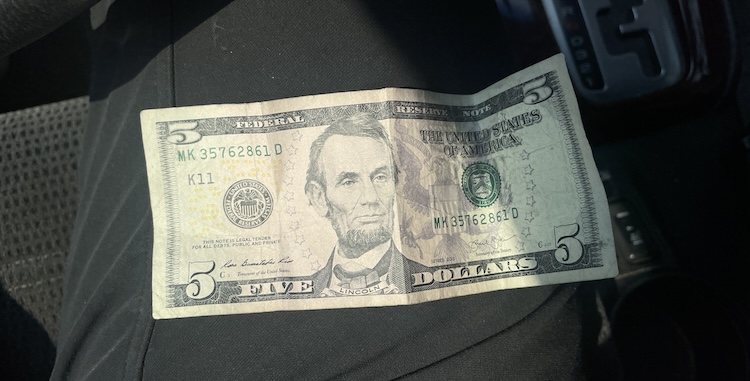What we want to avoid doing when we write stories, I tried to explain, is the "and then I found five dollars" ending. We were on Day 4 of a six-day trail running and writing workshop at the Whitefish Bike Retreat, and the students and I were talking about endings.
Some in the class were familiar with it, some had never heard of it, so I elaborated: "and then I found five dollars" is a way to end a story, usually one being told orally, when you a) don't know how/when you should end it, b) can sense midway through telling it that the story is maybe kind of pointless after all, or c) you can sense listeners' interest/enthusiasm/attention lagging near the end of your story. You panic, or pivot, to saying, "and then I found five dollars," which doesn't redeem your storytelling, but hopefully breaks the tension with a laugh.
Anyway, in written stories, we hope to avoid typing 1,000 words, getting to the natural ending point of the story, and then having to say, "and then I found five dollars." Which is really, mostly, a way of saying, "sorry I wasted your time LOL."

At this workshop, we do two sessions each day in which we talk about various aspects of writing a story, and between those two sessions, we go trail running. We dissect examples of essays about adventure, the outdoors and other topics (like The Summit by Susan Pope, Stop Telling Women Not To Go Into The Backcountry Alone by Krista Langlois, The Art of Apprehensive Adventuring by Meghan J. Ward, and The Pleasure And Pain Of The Climbing Life by Kelly Cordes) and of course I avoid using examples that employ the "and then I found five dollars" ending.
We discuss different types of endings—circling back to an opening scene, ending with a lesson learned, ending abruptly, ending ambiguously, ending with a question, ending with the absolute most lyrical sentence you can dream up—and how if the opening line of a story should, ideally, make the reader sit up and read, the ending will ideally make the reader sit back and think.
Throughout the week of the workshop, I try to remind the group (and myself) that my perspective is just one way of doing things, and it's worked for me, but media is constantly changing, and other writers and creators have vastly different ways of telling stories, and vastly different perspectives, and although none of us can predict the future and what sorts of story formats might work five years from now, humans generally love stories, so keep writing, and like every other writer, you'll figure it out as you go.
At the end of our workshop, we said our goodbyes, and I drove away from the Whitefish Bike Retreat with three students in my car, giving Kathy and Elizabeth a ride to the airport, and taking Kevin back to Missoula, where we both lived. The gravel road was a bit bumpy in spots, so I drove carefully, and scanned the road for the best line with the fewest potholes. In our four-way conversation, I was in the middle of saying something when I interrupted myself mid-sentence to say,
"There's a five-dollar bill in the middle of the road."
We all started laughing. I immediately stopped the car, and Kevin opened the passenger door, bolted out, walked ten steps back on the road, and returned with a five-dollar bill, folded into four sections. I think his urgency was less because it was free money, and more that we needed to verify that it was actually a five-dollar bill. Which it was.

One of the things I enjoy about writing, and the creative process in general, is that you can begin without knowing if your idea is any good, or even if it will make any sense to anyone else, and in the actual working out of whatever it is, you find the direction, or the meaning, or the ending. This is what I hope to communicate to the participants every year I teach this workshop, so they can feel emboldened to continue on their creative journeys.
And like every other year, I tried to wrap things up by reminding them that writing workshops are great, but when you get home and back to your real life, that's when the tough part begins: Finding time—and motivation—to write is more of a challenge, and you have to find ways to get re-inspired, and tactics to make yourself sit down and write even when you're not feeling it.
With that, we packed up and parted ways, each of us taking the first steps to navigating the transition, jumping out of the supportive nest of other writers/readers and into the solitude of sitting in a room staring at a blank page.
And then I found five dollars.
--
If you enjoyed this piece, please consider supporting my work.
No comments:
Post a Comment